| Oophaga | |
|---|---|
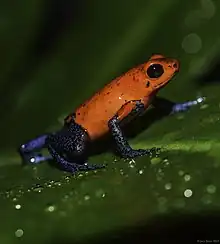 | |
| Oophaga pumilio | |
| Scientific classification | |
| Domain: | Eukaryota |
| Kingdom: | Animalia |
| Phylum: | Chordata |
| Class: | Amphibia |
| Order: | Anura |
| Family: | Dendrobatidae |
| Subfamily: | Dendrobatinae |
| Genus: | Oophaga Bauer, 1994 |
| Type species | |
| Dendrobates pumilio Schmidt, 1857 | |
| Diversity | |
| 12 species (see text) | |
Oophaga is a genus of poison-dart frogs containing twelve species, many of which were formerly placed in the genus Dendrobates.[1] The frogs are distributed in Central and South America, from Nicaragua south through the El Chocó to northern Ecuador (at elevations below 1,200 m (3,900 ft)).[1][2] Their habitats vary with some species being arboreal while other being terrestrial,[3] but the common feature is that their tadpoles are obligate egg feeders.[3][1][4][5] Most species in this genus are seriously threatened and O. speciosa is already extinct.[6]
Etymology
Oophaga, Greek for "egg eater" (oon, phagos),[7][8] is descriptive of the tadpoles' diet.[9][10]
Reproduction
While presumably all dendrobatids show parental care, this is unusually advanced in Oophaga: the tadpoles feed exclusively on trophic (unfertilized) eggs supplied as food by the mother; the father is not involved.[1][4] Through the eggs, the mother also passes defensive toxins to the tadpoles: Oophaga pumilio tadpoles experimentally fed with eggs from alkaloid-free frogs did not contain alkaloids.[11]
Species
There are twelve species in this genus:[2]
| Image | Scientific name | Common name | Distribution |
|---|---|---|---|
 |
Oophaga anchicayensis (Posso-Terranova and Andrés, 2018) | Chocó region of northwestern Colombia | |
| Oophaga andresi (Posso-Terranova and Andrés, 2018) | Cocorro | Columbia | |
| Oophaga arborea (Myers, Daly, and Martínez, 1984) | Polkadot poison frog | Panama | |
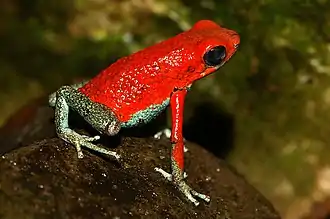 | Oophaga granulifera (Taylor, 1958) | Granular poison frog | Costa Rica and Panama |
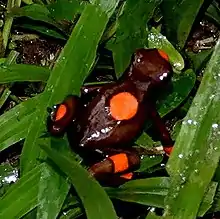 | Oophaga histrionica (Berthold, 1845) | Harlequin poison frog | El Chocó region of western Colombia |
.jpg.webp) | Oophaga lehmanni (Myers and Daly, 1976) | Lehmann's poison frog | western Colombia |
| Oophaga occultator (Myers and Daly, 1976) | La Brea poison frog | Cordillera Occidental in the Cauca Department of Colombia | |
 | Oophaga pumilio (Schmidt, 1857) | Strawberry poison-dart frog | eastern central Nicaragua through Costa Rica and northwestern Panama |
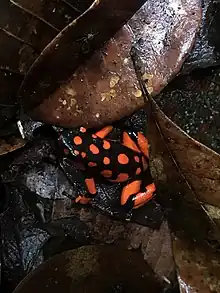 |
Oophaga solanensis (Posso-Terranova and Andrés, 2018) | Northwestern region of Colombia, on the western banks of the Atrato and san Juan rivers. | |
 | Oophaga speciosa (Schmidt, 1857) | Splendid poison frog | Cordillera de Talamanca, western Panama (extinct) |
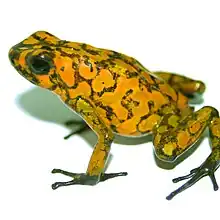 | Oophaga sylvatica (Funkhouser, 1956) | Diablito poison frog | southwestern Colombia and northwestern Ecuador. |
.jpg.webp) | Oophaga vicentei (Jungfer, Weygoldt, and Juraske, 1996) | Vicente's poison frog | Veraguas, Bocas del Toro, Colón and Coclé Provinces of central Panama |
Captivity
Oophaga may be kept as pets by experienced amphibian keepers, but they are challenging to breed in captivity as only parents can feed and care for tadpoles.[3]
References
- 1 2 3 4 Grant, T.; Frost, D. R.; Caldwell, J. P.; Gagliardo, R.; Haddad, C. F. B.; Kok, P. J. R.; Means, D. B.; Noonan, B. P.; Schargel, W. E. & Wheeler, W. C. (2006). "Phylogenetic systematics of dart-poison frogs and their relatives (Amphibia: Athesphatanura: Dendrobatidae)" (PDF). Bulletin of the American Museum of Natural History. American Museum of Natural History. 299: 1–262. doi:10.1206/0003-0090(2006)299[1:PSODFA]2.0.CO;2. S2CID 82263880.
- 1 2 Frost, Darrel R. (2022). "Oophaga Bauer, 1994". Amphibian Species of the World: An Online Reference. Version 6.1. American Museum of Natural History. Retrieved 29 March 2022.
- 1 2 3 "Oophaga — the obligate egg feeders". dendroWorks. 2011. Archived from the original on 11 August 2016. Retrieved 12 September 2014.
- 1 2 Vitt, Laurie J.; Caldwell, Janalee P. (2014). Herpetology: An Introductory Biology of Amphibians and Reptiles (4th ed.). Academic Press. p. 490.
- ↑ "Poison Dart Frog Genus Oophaga". www.dartfrog.pet. Retrieved 2022-04-21.
- ↑ "Oophaga". IUCN Red List. IUCN. Retrieved 3 December 2023.
- ↑ "-phagous | Origin and meaning of suffix -phagous by Online Etymology Dictionary".
- ↑ "Egg | Origin and meaning of egg by Online Etymology Dictionary".
- ↑ Heselhaus, R. 1992. Poison-arrow frogs: their natural history and care in captivity. Blandford, London.
- ↑ Zimmermann, E. and Zimmermann, H. 1994. Reproductive strategies, breeding, and conservation of tropical frogs: dart-poison frogs and Malagasy poison frogs. In: J.B. Murphy, K. Adler and J.T. Collins (eds), Captive management and conservation of amphibians and reptiles, pp. 255-266. Society for the Study of Amphibians and Reptiles, Ithaca (New York). Contributions to Herpetology, Volume 11.
- ↑ Stynoski, J. L.; Torres-Mendoza, Y.; Sasa-Marin, M.; Saporito, R. A. (2014). "Evidence of maternal provisioning of alkaloid-based chemical defenses in the strawberry poison frog Oophaga pumilio". Ecology. 95 (3): 587–593. doi:10.1890/13-0927.1. hdl:10669/76946. PMID 24804437.